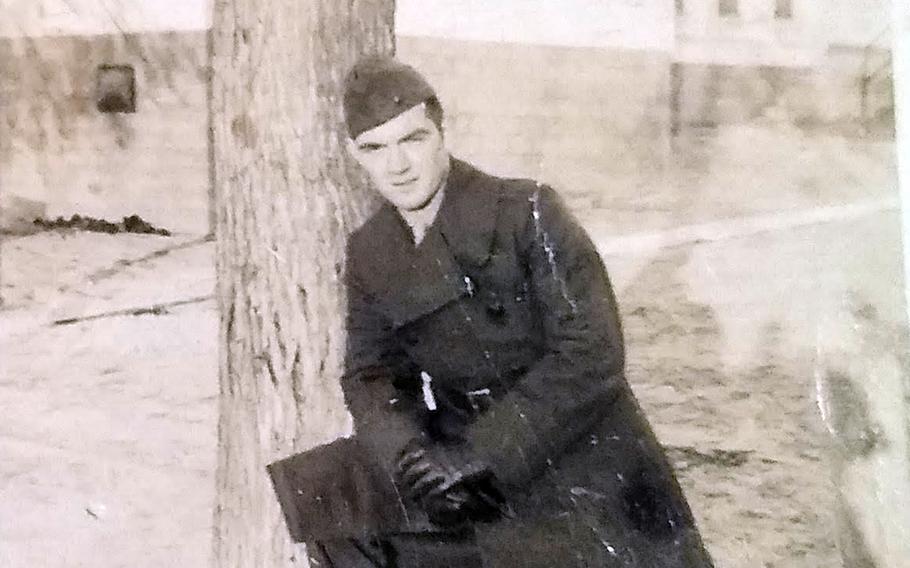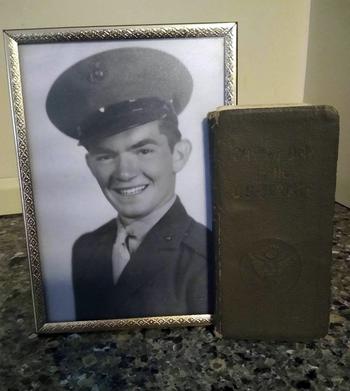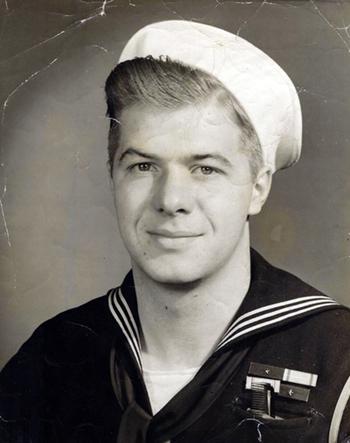
The wartime diary of Marine Sgt. Leo “Bull” McDermott arrived at the home of his daughter, Patti McDermott Dorschied, in Fairhaven, Mass., on Aug. 8, 2023, 81 years after Marines of the 1st Division went ashore on Guadalcanal. (Patti McDermott Dorschied)
The diary of a Marine who recorded his first eight months of World War II in the Pacific before fighting in some of its bloodiest battles is back with his family after it surfaced 81 years later.
Charlie Kitts, 70, of Acworth, Ga., was going through his late uncle’s personal effects in 2021 when he discovered the worn, government-issued book, he said by phone Sept. 5.
Petty Officer 1st Class Vincent Kitts served in the Navy during WWII, survived the Pearl Harbor attack on Dec. 7, 1941, and the sinking of the USS Astoria off Guadalcanal eight months later.
His nephew knew he had a treasure on his hands, but was dismayed to see someone else’s name, Leo McDermott, scrawled on the inside cover. The discovery started Charlie Kitts on a two-year quest to find McDermott’s family and give his diary to them.
The book arrived Aug. 8 at the home of McDermott’s daughter, Patti McDermott Dorschied, in Fairhaven, Mass., 81 years and a day after the Marines went ashore on Guadalcanal.
“I tell you, the way it came together, it was kind of like Leo was involved to make it happen,” Kitts said.
Vincent Kitts moved to St. Louis after the war and became a union millwright maintaining factory equipment, his nephew said. He died in 1997 at age 77.
His personal papers bounced around between family members before finally landing with his nephew in 2018. It took three years for Charlie Kitts to peer into the box collecting dust in the garage.
“When I saw the diary, my first thought was, ‘Oh, Uncle Vincent left the diary,’ and then, of course, I opened it,” he said. “There was a level of disappointment, but at the same time it was, ‘I wonder how he got it. I wonder who Leo was.’ ”

The wartime diary of Marine Sgt. Leo “Bull” McDermott sits on the mantel of his daughter’s home in Fairhaven, Mass., Aug. 8, 2023. (Patti McDermott Dorschied)
Bloody engagements
Sgt. Leo “Bull” McDermott served with K Company, 3rd Battalion, 1st Marines, of the storied 1st Marine Division, known as “The Old Breed,” Dorschied, 68, said by phone Sept. 6.
She said her father survived one bloody engagement after another, from the Battle of the Tenaru on Guadalcanal, where he received multiple shrapnel wounds, to Cape Gloucester, Peleliu and Okinawa.
McDermott returned home to Fairhaven and worked for the U.S. Postal Service, Dorschied said. He died in 1999 at age 76.
Their descendants said they don’t know how Leo and Vincent crossed paths or if they even knew each other. Vincent may have picked up the small leatherbound book after landing on Guadalcanal or he may have found it on one of the Navy transport ships.
The diary begins Jan. 5, 1942, nearly a month after the Pearl Harbor attack, and ends just before McDermott’s division landed on Guadalcanal. He described leaving to join the Marines, boot camp and boarding a transport ship. Some of the diary’s 32 inscribed pages are difficult to read.
“Arrived Parris Island 2:30 Wednesday afternoon,” says the entry for Jan. 7. “Got one shot today. Blood tests and vaccinations. One guy passed out at the sight of blood.”
On July 7, McDermott described sleeping on the unnamed ship’s deck, a common practice for surviving a nighttime torpedo attack.
“Cold as all hell today,” he wrote. “Damn near froze to death. Didn’t sleep a wink. Too dumb to give in.”
On Aug. 6, the eve of the Guadalcanal landing, the Marine described receiving ammunition.
“160 rounds. Plenty heavy,” he wrote. “Sang all night. Look out [Japanese]. Here we come!”
His final entry came the next day.
“Can’t take my diary with me,” he wrote. “If I don’t get back, so long folks!”

Navy Petty Officer 1st Class Vincent Kitts survived the Pearl Harbor attack on Dec. 7, 1941, along with the sinking of the USS Astoria off Guadalcanal in the Solomon Islands eight months later. (Charlie Kitts)
‘Incredible gift’
Charlie Kitts found McDermott’s family by calling Brad Fish, a former Marine and veterans service officer in Fairhaven.
Someone in Fish’s office remembered the McDermott family, so Fish took a drive, he said by phone Sept. 6. A few minutes later, he was face-to-face with Dorschied.
“He gave me Charlie’s number in case I wanted to get in touch with him, which I did after sitting here for a half an hour, shaking,” Dorschied recalled.
Kitts mailed the diary that day, he said. It now sits on Dorschied’s mantel next to a picture of her father.
She is planning to donate it and another diary her father kept, along with photos of Vincent and Leo, to the Fort Taber-Fort Rodman Military Museum in New Bedford, Mass.
Dorschied said she still talks to her new friend Charlie Kitts often. She is thankful to the man she calls Uncle Vincent for rescuing her father’s diary and preserving it all these years.
“It’s an incredible gift,” she said. “My dad’s come home again to me.”